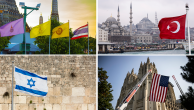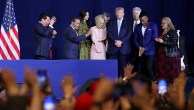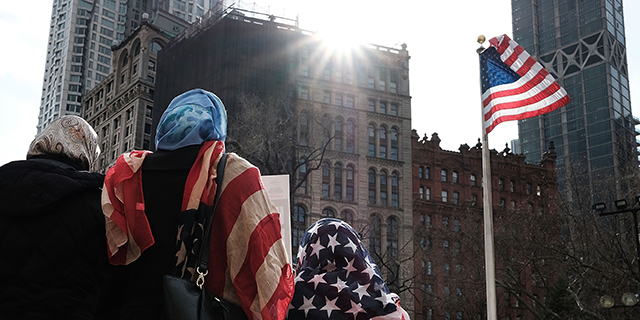
The early days of Donald Trump’s presidency have been an anxious time for many Muslim Americans, according to a new Pew Research Center survey. Overall, Muslims in the United States perceive a lot of discrimination against their religious group, are leery of Trump and think their fellow Americans do not see Islam as part of mainstream U.S. society.
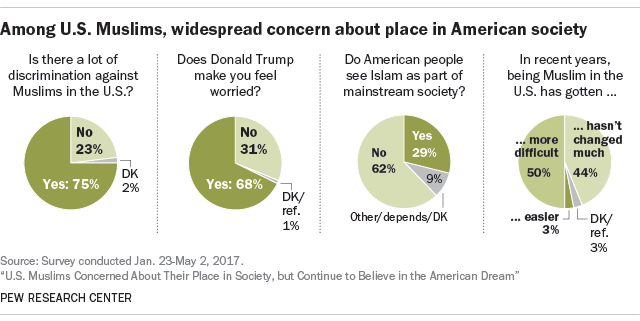
At the same time, however, Muslim Americans express a persistent streak of optimism and positive feelings. Overwhelmingly, they say they are proud to be Americans, believe that hard work generally brings success in this country and are satisfied with the way things are going in their own lives – even if they are not satisfied with the direction of the country as a whole.
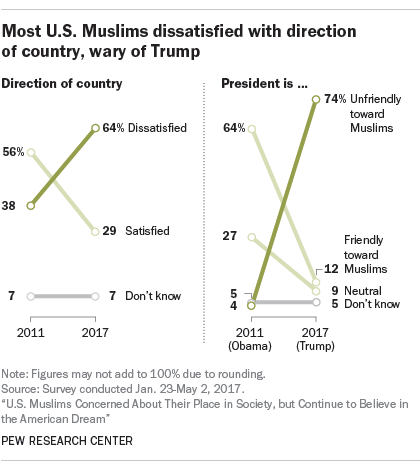
Indeed, nearly two-thirds of Muslim Americans say they are dissatisfied with the way things are going in the U.S. today. And about three-quarters say Donald Trump is unfriendly toward Muslims in America. On both of these counts, Muslim opinion has undergone a stark reversal since 2011, when Barack Obama was president, at which point most Muslims thought the country was headed in the right direction and viewed the president as friendly toward them.
In addition, half of Muslim Americans say it has become harder to be Muslim in the U.S. in recent years. And 48% say they have experienced at least one incident of discrimination in the past 12 months.
But alongside these reports of discrimination, a similar – and growing – share (49%) of Muslim Americans say someone has expressed support for them because of their religion in the past year. And 55% think Americans in general are friendly toward U.S. Muslims, compared with just 14% who say they are unfriendly.
Despite the concerns and perceived challenges they face, 89% of Muslims say they are both proud to be American and proud to be Muslim. Fully eight-in-ten say they are satisfied with the way things are going in their lives. And a large majority of U.S. Muslims continue to profess faith in the American dream, with 70% saying that most people who want to get ahead can make it in America if they are willing to work hard.
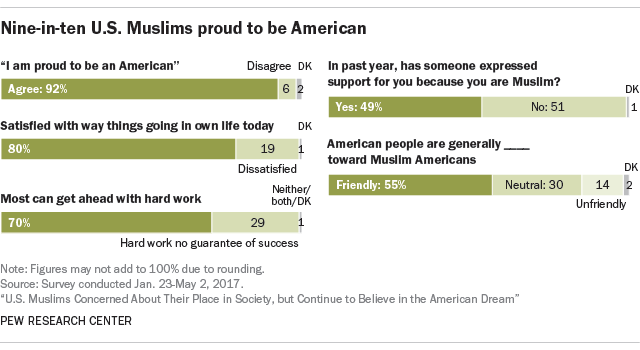
These are among the key findings of Pew Research Center’s new survey of U.S. Muslims, conducted Jan. 23 to May 2, 2017, on landlines and cellphones, among a representative sample of 1,001 Muslim adults living in the United States. This is the third time Pew Research Center has conducted a comprehensive survey of U.S. Muslims. The Center’s initial survey of Muslim Americans was conducted in 2007; the second survey took place in 2011.
The new survey asked U.S. Muslims about a wide variety of topics, including religious beliefs and practices, social values, views on extremism and political preferences. While the survey finds that a majority disapprove of the way Trump is handling his job, this is not the first time the community has looked askance at a Republican in the White House. Indeed, Muslim Americans are no more disapproving of Trump today than they were of George W. Bush’s performance in office during his second term a decade ago.
And while Muslims say they face a variety of challenges and obstacles in the U.S., this too is nothing new. The share of U.S. Muslims who say it is getting harder to be a Muslim in America has hovered around 50% over the past 10 years. Over the same period, half or more of Muslims have consistently said that U.S. media coverage of Muslims is unfair.
The Muslim population in the U.S. is growing and highly diverse, made up largely of immigrants and the children of immigrants from all across the world. Indeed, respondents in the survey hail from at least 75 nations – although the vast majority are now U.S. citizens. As a group, Muslims are younger and more racially diverse than the general population.
Muslims also are quite varied in their religious allegiances and observances. Slightly more than half of U.S. Muslims are Sunnis (55%), but significant minorities identify as Shiite (16%) or as “just Muslim” (14%). Most Muslims say religion is very important in their lives (65%), and about four-in-ten (42%) say they pray five times a day. But many others say religion is less important to them and that they are not so consistent in performing salah, the ritual prayers that constitute one of the Five Pillars of Islam and traditionally are performed five times each day.
The survey also shows that Muslims largely share the general public’s concerns about religious extremism. Indeed, if anything, Muslims may be more concerned than non-Muslims about extremism in the name of Islam. Yet most Muslims say there is little support for extremism within the U.S. Muslim community, and few say they think violence against civilians can be justified in pursuit of religious, political or social causes.
Muslims concerned about extremism, both globally and in U.S.
Overall, eight-in-ten Muslims (82%) say they are either very concerned (66%) or somewhat concerned (16%) about extremism in the name of Islam around the world. This is similar to the percentage of the U.S. general public that shares these concerns (83%), although Muslims are more likely than U.S. adults overall to say they are very concerned about extremism in the name of Islam around the world (66% vs. 49%).
About seven-in-ten Muslims – and a similar share of Americans overall – are concerned about extremism in the name of Islam in the U.S., including roughly half of U.S. Muslims (49%) who say they are very concerned about domestic extremism.
Among both Muslims and the larger U.S. public, concern about extremism around the world is higher now than it was in 2011 (see Chapter 5 for details on trends over time).
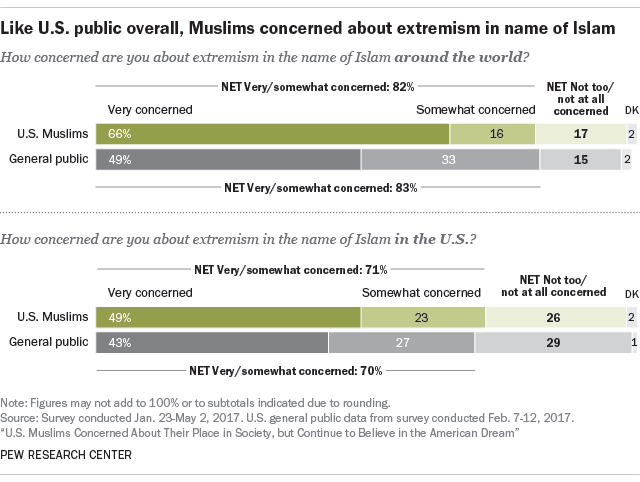
While concern about extremism has risen, there is little change in perceptions of how much support for extremism exists among Muslims in the United States. Nearly three-quarters of U.S. Muslims (73%) say there is little or no support for extremism among American Muslims, while about one-in-six say there is either a “fair amount” (11%) or a “great deal” (6%) of support for extremism within the U.S. Muslim community.
The overall American public is more divided on this question. While 54% of U.S. adults say there is little or no support for extremism among Muslim Americans, roughly a third (35%) say there is at least a “fair amount” of backing for extremism among U.S. Muslims, including 11% who think there is a “great deal.” (For more information about how the U.S. public views Muslims and Islam, see Chapter 7.)
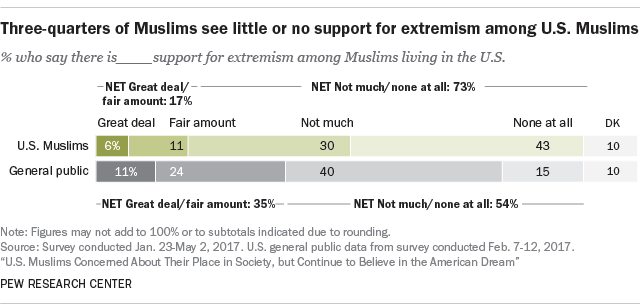
When is killing civilians seen as justifiable?
To better understand what some people had in mind when answering this question about targeting and killing civilians for political, social or religious reasons, Pew Research Center staff called back a small number of respondents and conducted non-scientific follow-up interviews. Many respondents – both Muslims and non-Muslims – who said violence against civilians can sometimes or often be justified said they had in mind situations other than terrorism, such as military action or self-defense. For more details on this question, see Chapter 5.
When asked whether targeting and killing civilians can be justified to further a political, social or religious cause, 84% of U.S. Muslims say such tactics can rarely (8%) or never (76%) be justified, while 12% say such violence can sometimes (7%) or often (5%) be justified.
This question was designed to be asked of the general public as well. Compared with the U.S. public as a whole, Muslims are more likely to say targeting and killing civilians for political, social or religious reasons is never justifiable (76% vs. 59%). Roughly equal shares of Muslims (5%) and Americans as a whole (3%) say such tactics are often justified (the difference between these numbers is not statistically significant).1
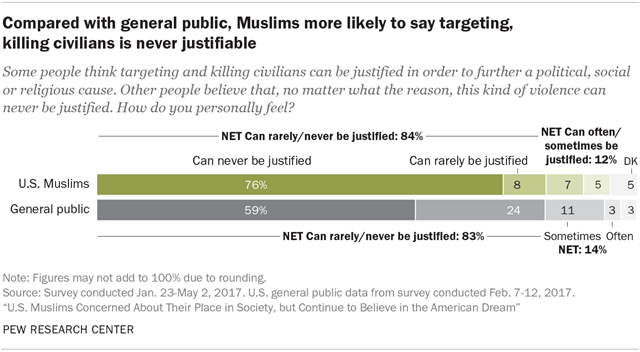
While U.S. Muslims are concerned about extremism and overwhelmingly opposed to the use of violence against civilians, they also are somewhat mistrustful of law enforcement officials and skeptical of the integrity of government sting operations. About four-in-ten U.S. Muslims (39%) believe most Muslims who have been arrested in the U.S. on suspicion of plotting terrorist acts posed a real threat. But three-in-ten (30%) say law enforcement officers have arrested mostly people who were tricked and did not pose a real threat. And an additional three-in-ten volunteer that “it depends” or offer another response or no response. Views on this topic among the general public are less divided: A majority of U.S. adults (62%) say officers in sting operations have mostly arrested people who posed a real threat to others.
Meanwhile, about a third of Muslim Americans say they are either very worried (15%) or somewhat worried (20%) that the government monitors their phone calls and emails because of their religion. However, on a different question – which does not mention religion – Muslims actually are less likely than Americans overall to think the government is monitoring them: About six-in-ten Muslims (59%) say it is either very likely or somewhat likely that the government monitors their communications, compared with 70% of the general public.
Roughly half of Muslims say they have experienced recent discrimination
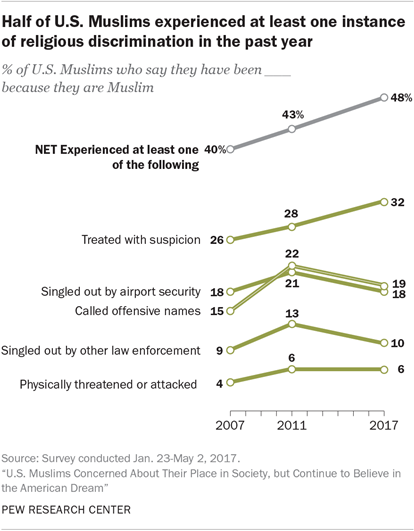
In addition to gauging broad concerns about discrimination, the survey also asked Muslims whether they personally have experienced a few specific kinds of discrimination within the past year. The share of U.S. Muslims who say they have faced at least one of these types of discrimination has risen modestly in recent years.
About a third of Muslims, for example, say they have been treated with suspicion over the past 12 months because of their religion. Nearly one-in-five say they have been called offensive names or singled out by airport security, while one-in-ten say they have been singled out by other law enforcement officials. And 6% say they have even been physically threatened or attacked.
In total, nearly half of Muslims (48%) say they have experienced at least one of these types of discrimination over the past year, which is up slightly from 2011 (43%) and 2007 (40%). In addition, nearly one-in-five U.S. Muslims (18%) say they have seen anti-Muslim graffiti in their local community in the last 12 months.
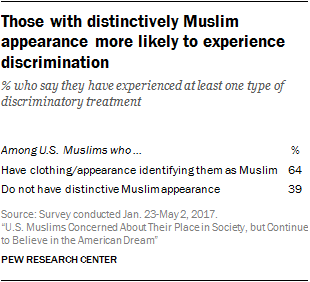
Experiences with discriminatory treatment are especially common among those whose appearance identifies them as Muslim. Overall, about four-in-ten Muslims (38%) – including half of Muslim women (49%) – say that on a typical day, there is something distinctive about their appearance, voice or clothing that people might associate with Muslims. Of those whose appearance is identifiably Muslim, nearly two-thirds (64%) say they have experienced at least one of the specific types of discrimination asked about in the survey. Among Muslims who say they do not have a distinctively Muslim appearance, fewer report these types of experiences (39%).
While roughly half of Muslims say they have experienced a specific instance of discrimination over the past year, a similar share (49%) say someone has expressed support for them because they are Muslim in the past 12 months. The percentage of U.S. Muslims who report this type of experience is up significantly since 2011 (37%) and 2007 (32%).
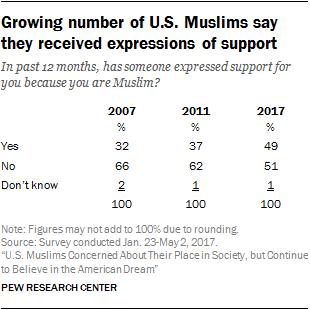
In their own words: What Muslims said about discrimination and support
Pew Research Center staff called back some of the Muslim American respondents in this survey to get additional thoughts on some of the topics covered. Here is a sampling of what they said about their experiences with discrimination and the expressions of support they have received:
“I have definitely experienced both [discrimination and support]. I’ve had people make comments and of course they’ll give me weird looks and things like that. But I’ve definitely heard people [make] rude comments straight to my face. I’ve also had people say really nice things about my hijab, or say it’s beautiful or say they think my religion is beautiful.” – Muslim woman under 30
“There was a time where I used to wear a veil that covered my face, the niqab, and I take public transportation, and when I was on a bus someone claimed I was a terrorist. I did not know what to do because no one ever called me that. The person was sitting near me, and I remember getting off the bus. No one came to my defense and I did not expect anyone to come to my defense. If you cover your face, people assume you are dangerous. I don’t wear the niqab anymore. … I heard a woman took a bus and she wore niqab and got attacked. People were worried for my safety, and I did not want to take a chance. I wear the hijab [covering the hair, but not face] now. This happened a year ago and after that I stopped wearing a niqab. Now, I get questions a lot, but people are not afraid. [When wearing the niqab], people assumed I was not born here and don’t speak English. Even wearing hijab I get that. But with hijab, there is curiosity but not discrimination.” – Muslim woman under 30
“I have lived in this country for 15 years and have never had a bad experience because of my religion or faith.” – Muslim woman over 60
“I have never experienced discrimination in a direct or targeted way. Things have been very good. But sometimes I see someone looking at me funny because of my accent and the way I look, and it makes me a little uncomfortable. But I have a lot of support. Everyone I work with supports me, so I have many people who can help.” – Muslim man under 30
“I have a lot of friends, and just community members, who are very open – who are glad to have this kind of diversity in their community, where there aren’t a lot of Muslims at all. I’m probably the only Muslim they know or they’ll ever know. And they’re glad for that, and they like to give support and be there.” – Muslim man under 30
“Occasionally [my daughter] would say kids make fun of her. Or the kids would ask, ‘Are you bald under hijab?’ ‘Why don’t you show your hair?’ … [While attending a parade], a couple from [the South] engaged my daughter, and my wife was sitting on one bench and my other daughter and I were sitting on another. And she started asking her, ‘Does your dad make you wear this?’ And my daughter was prepared to respond and said, ‘Nope. This is my choice. He supports me. It’s not required. My mom doesn’t wear it. But I wear it because I choose to wear it.’ I think those types of experiences are something she goes through, and I think we basically reassure her every time that we get an opportunity: ‘This is what you’ve chosen to do. Now you have chosen to express yourself, and we stand by you 100%. This is America and everyone is free to choose to live the way they choose.’” – Muslim father
Muslims leery of Trump
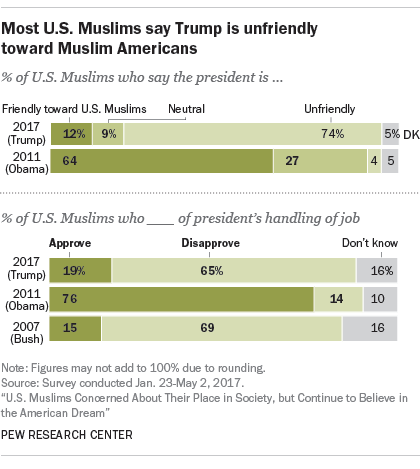
The relationship between Donald Trump and the U.S. Muslim community has received a lot of media coverage, especially following Trump’s statement during the campaign that he would seek a “total and complete shutdown of Muslims entering the United States” and his executive order blocking travel from six Muslim-majority countries. 2
About three-quarters of Muslim Americans (74%) say the nation’s new chief executive is unfriendly toward their group, while two-thirds (65%) say they disapprove of the way Trump is handling his job as president. U.S. Muslim opinion on the sitting president has turned dramatically since 2011, when Muslims expressed much more positive views of Barack Obama.
In 2007, near the end of his second term, George W. Bush received approval ratings from U.S. Muslims that were about as low as Trump’s today. Respondents in that survey were not asked whether they thought Bush was friendly toward Muslim Americans.
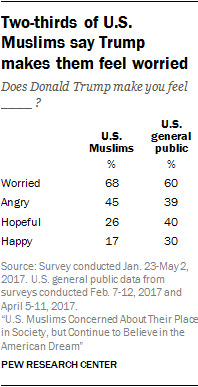
In the new survey, respondents were asked whether Trump makes them feel four emotions – two positive (hope and happiness) and two negative (worry and anger). Fully two-thirds of Muslim Americans (68%) say the president makes them feel worried, and 45% say he makes them feel angry. Far fewer say the president makes them feel hopeful (26%) or happy (17%).
Muslim Americans are less likely than the public as a whole to say Trump makes them feel hopeful (26% vs. 40%) or happy (17% vs. 30%), but about as likely to say Trump makes them feel worried or angry.
Muslims proud to be American, but say they face significant challenges in U.S. society
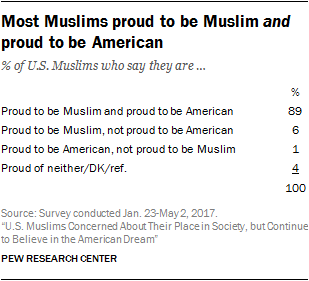
U.S. Muslims express pride in their religious and national identities alike. Fully 97% agree with the statement, “I am proud to be Muslim.” Nearly as many (92%) say they agree with the statement, “I am proud to be an American.” In total, 89% agree with both statements, saying they are proud to be Muslim and proud to be American. Just 6% say they are proud to be Muslim and not proud to be American, and 1% say they are proud to be American and not proud to be Muslim.
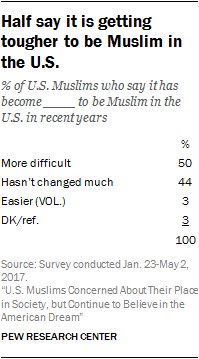
At the same time, many Muslims say they face a variety of significant challenges in making their way in American society. Fully half say that it has become more difficult to be Muslim in the U.S. in recent years, and an additional 44% say the difficulty or ease of being Muslim has not changed very much. Just 3% volunteer that it has become easier to be Muslim in America.
Muslims who say it has become more difficult to be Muslim in the U.S. in recent years were asked to describe, in their own words, the main reasons for this. The most common responses include statements about Muslim extremists in other countries, misconceptions and stereotyping about Islam among the U.S. public, and Trump’s attitudes and policies toward Muslims. (For full details, see here.)
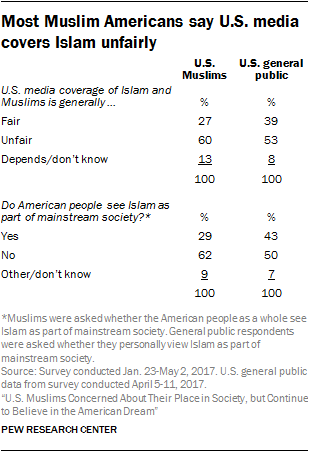
Most Muslims (60%) also perceive media coverage of Muslims and Islam as unfair, and a similar share (62%) think the American people as a whole do not see Islam as part of mainstream American society. These views are largely echoed by U.S. adults overall, many of whom agree that media coverage of Muslims is unfair and say they personally do not see Islam as part of mainstream society.
But tension is not the only thing that defines the relationship between Muslims and the rest of the U.S. population. Six-in-ten U.S. Muslims say they have a lot in common with most Americans. And Muslims are much more likely to say the American people, in general, are friendly toward Muslims in the country (55%) than to view Americans as a whole as unfriendly (14%). (Three-in-ten say Americans are generally neutral toward Muslims.) Moreover, U.S. Muslims have become slightly more likely to view the American public as friendly toward them since 2011, when 48% took this position.
Muslim women more concerned than men about their place in society
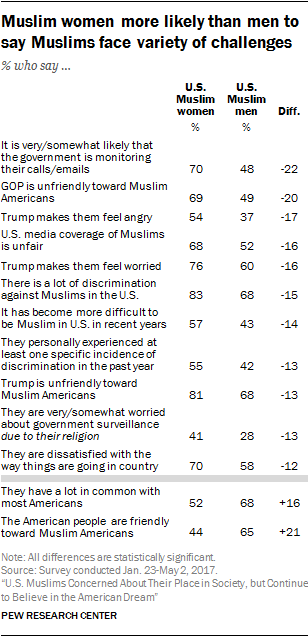
The survey finds a consistent gender gap on several questions about what it is like to be a Muslim in America, showing that Muslim women have a higher level of concern than Muslim men about the place of Muslims in U.S. society.
For example, more Muslim women than men say that there is a lot of discrimination against Muslims in the U.S. today, that they have personally experienced discrimination and that it has become more difficult to be Muslim in the U.S. in recent years.
In addition, more Muslim women than men say Donald Trump makes them angry or worried, and more women than men say both Trump and the Republican Party are unfriendly toward Muslim Americans.
Muslim women are more likely than Muslim men to say that they are dissatisfied with the way things are going in the country and that media coverage of Muslims is unfair. Meanwhile, more Muslim men than women say that they have a lot in common with most Americans and that the American people in general are friendly toward Muslim Americans.
In their own words: What Muslims said about their place in America
Pew Research Center staff called back some of the Muslim American respondents in this survey to get additional thoughts on some of the topics covered. Here is a sampling of what they said about what it is like to be a Muslim in the United States in 2017:
[survey]
“I don’t really feel like I have a lot in common with most Americans. It depends on their upbringing, their race, everything like that. I think that we have a lot of different ideals, and we believe a lot of different things. … So I do feel a lot different, a sense of not fitting in as much.” – Muslim woman under 30
“What I have in common with most Americans is a dedication to this country. We also have in common our shared humanity. … We’re all struggling to earn, pay our taxes and raise our kids. More and more, I’m finding it hard to find common ground with people who don’t understand minority communities. The minorities are becoming the majority, and I know that’s hard for some people. I feel sympathy for them; empathy as well. But they need to accept this new reality.” – Muslim woman in her 40s
“There is so much attention drawn to people being Muslim and symbols of Islam, hijab being one of them. We have to take extra caution scanning our surroundings – know where we are, who is around and what kind of thoughts they might hold for Islam, about Islam or against Islam. Especially when the Muslim ban was introduced the first time around, I literally felt like the persecution had started. Because we had read the history of Europe and what happened to the Jewish people in Germany. These little steps lead to bigger issues later on. So, we really felt like we were threatened. And, fortunately, the justice system stopped implementation. And later on people stopped talking about it, and after a while it seemed like things might be getting better.” – Immigrant Muslim man
“I see some immigrants – and not just Muslims, they could be Latinos too – who don’t adapt well to their new country and don’t want to be part of American society. They stick with others like themselves because they’re afraid and feel strange here. But that’s not me. I am completely American, and I feel at home here. When I first came here, I went to high school and that helped me to become more fully American and to adapt to the culture. I feel like I have a lot in common with the people I meet and know here, and I feel completely comfortable here. When you arrive in America as an immigrant, you have to let your past go, or else you won’t be able to become a part of your new country.” – Muslim man under 30
“I’d say it’s been increasingly difficult, really. You almost get that post-9/11 atmosphere in the United States because of the suppression, really, of minorities and minorities’ thoughts and voices. People like the alt-right or ultraconservative Trump supporters now have a larger voice that was suppressed just years ago, and now they’re really allowed to make heard what they think about Muslims and minorities in general. So it’s a lot of tensions have been rising and fears that we’re going backward.” – Muslim man under 30
Muslim demographics: A diverse and young population
Muslims represent a relatively small but rapidly growing portion of the U.S. religious landscape. Pew Research Center estimates that there are 3.45 million Muslims of all ages living in the U.S. – up from about 2.75 million in 2011 and 2.35 million in 2007. This means Muslims currently make up roughly 1.1% of the U.S. population. 3 (For more information about how many Muslims live in the U.S. and about how Pew Research Center calculates these figures, see Chapter 1.)
Muslim Americans are largely an immigrant population: Roughly six-in-ten U.S. Muslims ages 18 and over (58%) were born outside the U.S., with origins spread throughout the world. The most common region of origin for Muslim immigrants is South Asia, where one-in-five U.S. Muslims were born, including 9% who were born in Pakistan. An additional 13% of U.S. Muslims were born elsewhere in the Asia-Pacific region (including Iran), 14% in the Middle East or North Africa, and 5% in sub-Saharan Africa.
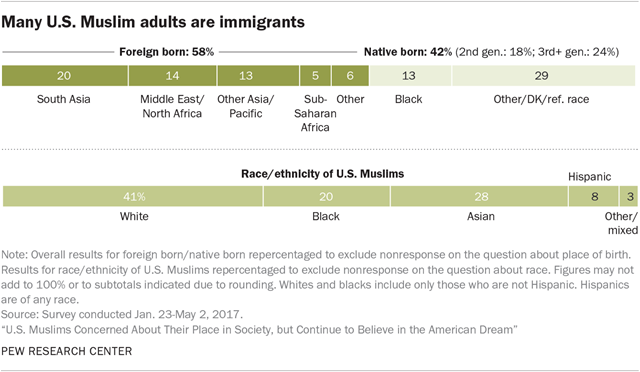
Due in no small part to their wide range of geographic origins, U.S. Muslims are a racially and ethnically diverse population. No single racial group forms a majority, with about four-in-ten Muslim adults (41%) identifying as white (including Arabs and people of Middle Eastern ancestry), 28% identifying as Asian (including people of Pakistani or Indian descent) and one-in-five identifying as black or African American.
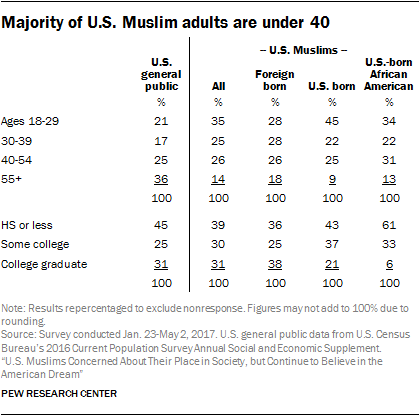
The data also show that Muslim Americans are a very young group. Most Muslim adults (60%) are under the age of 40. By comparison, just 38% of the U.S. adult population as a whole is younger than 40.
Three-in-ten Muslims (31%) are college graduates, which is on par with the share of U.S. adults as a whole who have completed college. But Muslim immigrants are, on average, more highly educated than both U.S.-born Muslims and the U.S. public as a whole. (For more on the demographics of the U.S. Muslim population, see Chapter 1.)
Muslims say their faith is not only about beliefs and rituals
The diversity of Muslims in the U.S. extends to religious beliefs and practices as well. While nearly all Muslims say they are proud to be Muslim, they are not of one mind about what is essential to being Muslim, and their levels of religious practice vary widely.
Most U.S. Muslims (64%) say there is more than one true way to interpret Islam. They also are more likely to say traditional understandings of Islam need to be reinterpreted in light of modern contexts (52%) than to say traditional understandings are all that is needed (38%).
Muslims also were asked whether each of eight actions and behaviors is an “essential” part of what being Muslim means to them, an “important but not essential” part or “not an important” part. Fully 85% of Muslims say believing in God is essential to what being Muslim means to them, more than say the same about any other item in the survey. And nearly three-quarters say “loving the Prophet Muhammad” is essential to what being Muslim means to them.
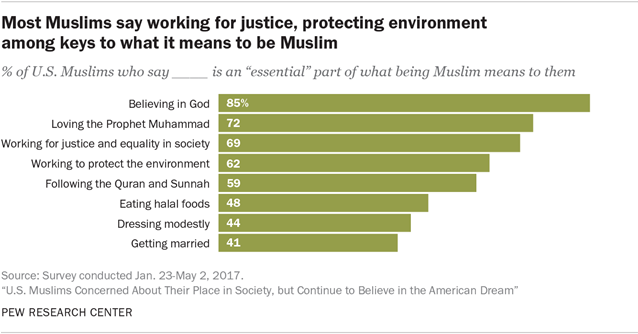
Yet many U.S. Muslims say that for them, personally, being Muslim is about more than these core religious beliefs. Roughly seven-in-ten, for instance, say “working for justice and equality in society” is an essential part of their Muslim identity, and 62% say the same about “working to protect the environment” – which is higher than the share of U.S. Christians who said protecting the environment is essential to their Christian identity in response to a similar question (22%).
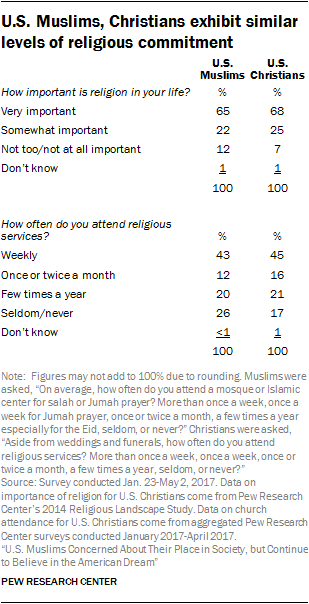
In other ways, though, U.S. Muslims look similar to U.S. Christians – on average, the two groups show roughly equal levels of religious commitment. About two-thirds of U.S. Muslims (65%), for instance, say religion is very important in their lives, as do 68% of Christians, according to Pew Research Center’s 2014 Religious Landscape Study. And 43% of Muslim Americans say they attend a mosque on a weekly basis, on par with the 45% of U.S. Christians who have described themselves as weekly churchgoers in recent surveys. Another 12% of U.S. Muslims say they go to a mosque monthly, and one-in-five (20%) say they go to a mosque a few times a year, especially for important Muslim holidays such as Eids.4 (For more information on Eid and other terms, see the glossary.)
The survey also shows that eight-in-ten Muslim Americans say they fast during the Islamic holy month of Ramadan. And roughly four-in-ten Muslims (42%) say they pray all five salah daily, with another 17% saying they make some of the five salah each day. (Salah is a form of ritual prayer or observance performed throughout the day, and praying salah is one of the Five Pillars of Islam. For more information, see the glossary.)
Social values: Growing acceptance of homosexuality
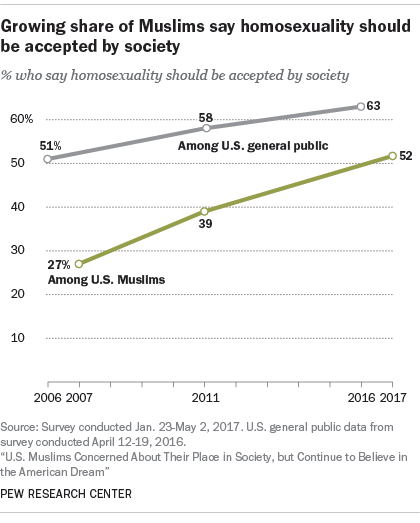
American Muslims, like the U.S. public as a whole, have become much more accepting of homosexuality in recent years. In the first Pew Research Center survey of Muslims, in 2007, far more Muslims said homosexuality should be discouraged by society (61%) than said it should be accepted (27%). By 2011, Muslims were roughly evenly split on this question. Today, Muslims who say homosexuality should be accepted by society clearly outnumber those who say it should be discouraged (52% vs. 33%).
While Muslims remain somewhat more conservative than the general public on views toward homosexuality, they are more ideologically liberal than U.S. adults overall when it comes to immigration and the size of government. About eight-in-ten U.S. Muslims believe that immigrants strengthen the country with their hard work and talent (79%), which is perhaps not surprising, given that most Muslims are themselves immigrants. And two-thirds of Muslim Americans (67%) say they prefer a larger government that provides more services over a smaller government that provides fewer services.
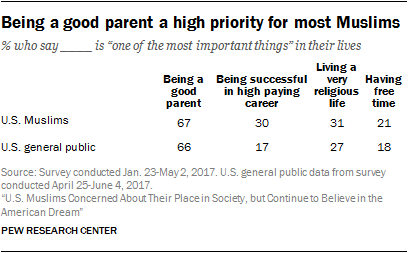
On some other issues, the views of U.S. Muslims mirror those of the larger public. Like Americans overall, most Muslims rank being a good parent as “one of the most important things” in their lives, and they tend to rate having a successful career and living a very religious life as at least somewhat important but not necessarily among the most important things in life.
Political preferences: Muslims are strongly Democratic
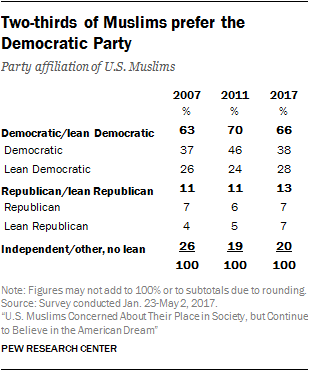
Two-thirds of U.S. Muslims either identify as Democrats or lean toward the Democratic Party; far fewer (13%) identify as Republican or lean toward the GOP. Muslims favored the Democratic Party over the GOP by comparable margins in both previous Pew Research Center surveys.
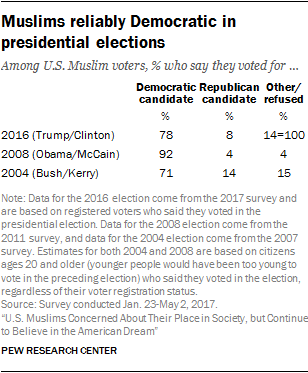
When asked how they voted in last year’s presidential election, three-quarters of Muslim voters (78%) say they backed Hillary Clinton, 8% say they voted for Trump, and 14% say they voted for another candidate or decline to say how they voted. Clinton’s 70-point margin of victory over Trump among Muslims falls short of Barack Obama’s margin over John McCain; in the 2011 survey, 92% of U.S. Muslim voters said they cast ballots for Obama in 2008, compared with just 4% who reported voting for McCain. In 2007, 71% of U.S. Muslims said they voted for John Kerry in 2004, compared with 14% who voted for George W. Bush.
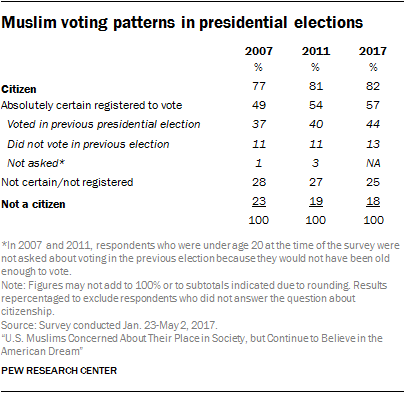
Overall, 44% of U.S. Muslims say they voted in the 2016 election.5 Nearly one-in-five Muslim adults living in the U.S. (18%) are not U.S. citizens, and thus not eligible to vote. In addition, one-in-four Muslims are citizens but are not registered to vote (25%), and 13% of Muslims are registered voters who stayed home on Election Day.6
Two-thirds of Muslims (65%) say they do not think there is a natural conflict between the teachings of Islam and democracy, while three-in-ten say there is an inherent conflict between Islam and democracy.
Those who say there is a conflict were asked to explain, in their own words, why they think Islam and democracy clash. Some say that Islam and democracy have fundamentally incompatible principles and values (40% of those who say there is a conflict), others say the apparent conflict is because non-Muslims don’t understand Islam or because terrorists give Islam a bad name (16%), and still others say democracy is incompatible with all religion (9%). (For more details on responses to these questions, see Chapter 4.)

